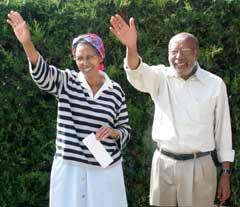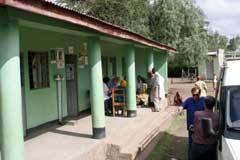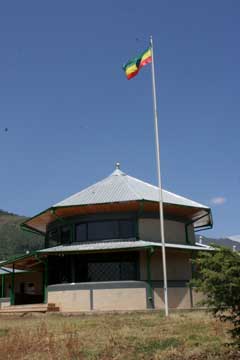Ethiopia
2006
~
Future Direction

Toward the end of our trip Marta and Deme asked some of us for our thoughts on their operation and possible help that future teams could bring. We were humbled to have been asked for our input and so appreciated the spirit in which it was asked. The attitude of "not myself, but thou" that came through in the asking and the listening was a blessing to see! Thank you, Marta and Deme, for your humility and grace!
We responded, with some trepidation, that what we had observed was a truly remarkable center of community life for this part of Ethiopia. The people in and around Yetebon had gained much from the presence of Project Mercy: a school, a center of adult education, clean water, an agriculture center, and a hospital. God's hand was obviously upon this project: a Christian organization in a Muslim community was a rarity, and the coexistence was wonderful to see. This was a work that was born in love toward the Ethiopian people, who in this case happened to be Muslim. The presence of a Christian church as part of the effort was seemingly not a threat to the community leaders, nor was the strong Muslim influence of the families served a threat to Marta and Deme.
We did observe, however, that future teams could help the hospital staff move forward in their skill sets by offering inservices for nursing, laboratory, radiology, and other personnel. Work could also be done in the area of integration of clinical care between nursing and physician staff, and suggestions were made for how that might happen via future teams traveling to the area. These teams might be from MPPC or other organizations. Also, the rural mobile health clinics were a wonderful way to extend the reach of Project Mercy and we felt future teams could continue this aspect of the work we had done.
Another idea was that a partnership might be developed between either a medical school or a business school and Project Mercy. These partnerships might offer administrative or faculty know-how which would assist Project Mercy complete its mission as well as offer a training ground for the American students at those partnering institutions. These partnerships might eventually lead to Project Mercy being some sort of regional center of excellence with an active outreach in continuing education of health aides in the surrounding rural villages.
A final recommendation, which actually turned out to be more of an encouragement for Marta and Deme who had already had the same thought, was to view this project as a demonstration project that could, and should, be replicated in other parts of Ethiopia or Africa.





